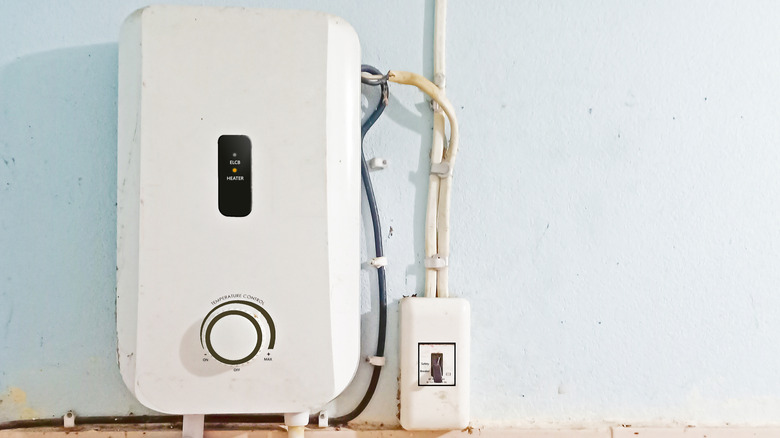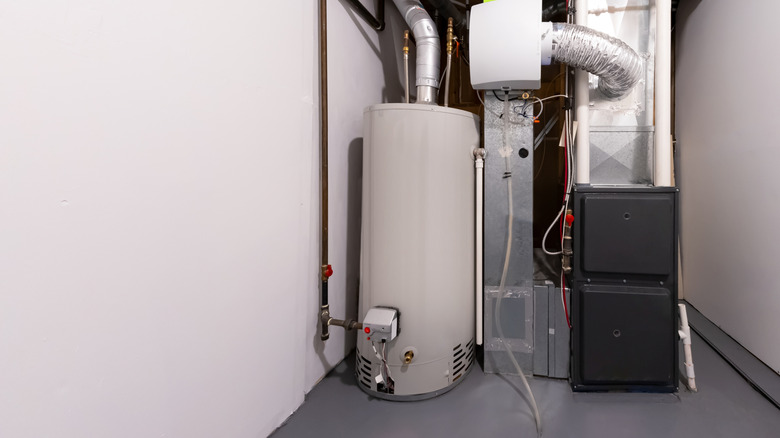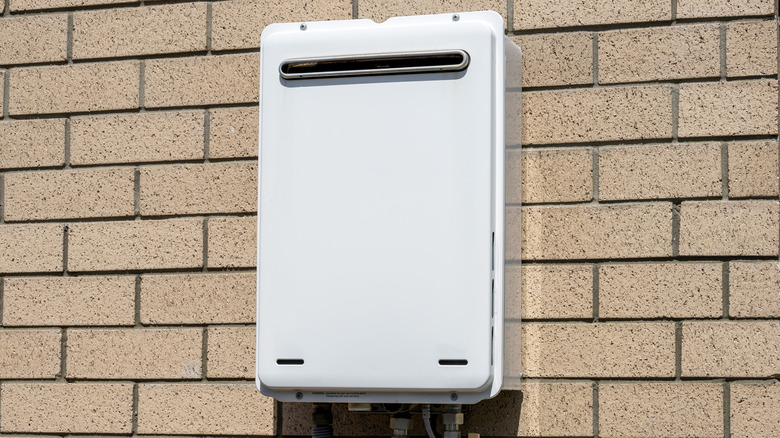Tankless Water Heater Vs Tank: Which Is More Energy-Efficient For Your Home?
The lure of tankless water heaters is strong for homeowners, and for good reasons. They last longer, take up less space, and are more efficient. They are a bit more expensive, though that can be difficult to calculate given how much you're likely to save on power with a more efficient tankless setup. House Digest spoke exclusively with licensed appliance repair technician Ian Thomas, Licensed Appliance Repair Technician and Virtual Appliance Expert at Frontdoor, about water heater efficiency, and he gave us some great insights into the key differences between storage (tank-style) and tankless water heaters.
The main difference, of course, is that storage water heaters use a tank, while tankless models heat water on demand. That means the quantity of hot water a storage heater makes available is limited by the tank's capacity, while tankless systems can provide an unending stream of heated water. But each has its pros and cons, and not taking energy efficiency or any of its related factors into account is a common mistake when buying a water heater.
Both are available in gas and electric versions; the other key decision in deciding which water heater is right for your home. "Gas fired tankless water heaters are typically more efficient than tank style heaters," Thomas explained. "Gas tank and tankless water heaters use a combustible, usually propane or natural gas, to create a flame. The flame is then used to heat the water," he added. "Electric tank and tankless water heaters use heating elements that, through resistance, use electricity to generate heat that is transferred to the water." In most cases, you'll choose gas or electric based on the type of heater you currently have.
Storage water heater pros and cons
Energy efficiency matters in two ways. It's obviously better for the environment to use efficient appliances, and it also costs less to own and operate an efficient appliance... at least in the long run. It typically costs less to install and maintain tankless water heaters, Frontdoor appliance expert Ian Thomas told House Digest. Tank-style gas water heaters come in two varieties — natural draft and power vent models — that have comparable efficiency. However, natural draft water heaters can cost half the price of power vent units, and power vent heaters also require electric service at the appliance to operate its blower. Storage water heaters with a tank operate for around 8-12 years and tend to be less long-lived than tankless models, which can run for 15-20 years, Thomas said — another cost factor to consider when you're calculating savings from energy efficiency.
In terms of pure efficiency, though, the issue is simpler. Tank water heaters are less energy-efficient than tankless heaters. "This difference is due to the fact that a tankless water heater is only heating water when it is used compared to a tank style that keeps its full capacity (typically 40-50 gallons) hot at all times," Thomas explained.
Tankless pros and cons
Gas-powered tankless water heaters, like gas tank models, have a few complexities of their own. When House Digest spoke with appliance expert Ian Thomas, he explained, "Tankless water heaters can be broken into two main categories — condensing and non-condensing water heaters." Condensing water heaters are more efficient — as much as 97%, compared with non-condensing efficiencies of around 80%. "As their name suggests," Thomas said, "they produce condensation that must be drained away from the unit as a byproduct of its higher efficacy." This means that condensing units, which also cost more themselves, will typically have higher installation costs.
All of that factors into your decisions about water heater efficiency, but overall tankless heaters can be as much as 34% more efficient than their tank-style counterparts, Thomas said. "The amount of extra efficiency can be directly related to the amount of hot water a household uses," he explained. "According to the U.S Department of Energy, [for] a home that averaged a large volume of water (86 gallons per day), a homeowner can expect up to 14% less energy use with a tankless v.s. a tank style water heater. However, the same heaters in a home with a relatively low water usage (under 41 gallons) can expect to see up to a 34% reduction in energy use in the tankless water heater compared to a tank." Tankless water heaters also last longer, as we noted above.


